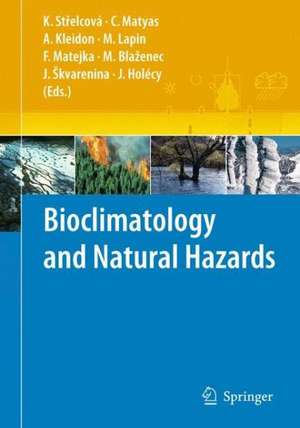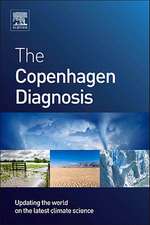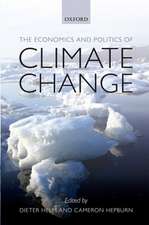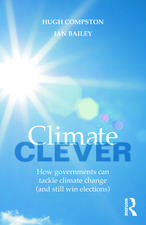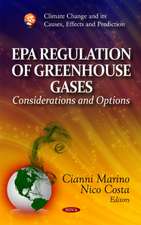Bioclimatology and Natural Hazards
Editat de Katarína Strelcová, Csaba Matyas, Axel Kleidon, Milan Lapin, František Matejka, Miroslav Blazenec, Jaroslav Škvarenina, Jan Holecyen Limba Engleză Paperback – 19 oct 2010
This book presents research on the interactions between meteorological, climatological, hydrological and biological processes in the atmospheric and terrestrial environment. It highlights a spectrum of topics associated with climate change and weather extremes and their impact on different economic sectors. The contributing authors come from renowned scientific research institutions and universities and specialise in issues of climate change, soil-plant-atmosphere interactions, hydrologic cycle, ecosystems, biosphere, and natural hazards.
| Toate formatele și edițiile | Preț | Express |
|---|---|---|
| Paperback (1) | 796.51 lei 38-44 zile | |
| SPRINGER NETHERLANDS – 19 oct 2010 | 796.51 lei 38-44 zile | |
| Hardback (1) | 963.91 lei 6-8 săpt. | |
| SPRINGER NETHERLANDS – 9 ian 2009 | 963.91 lei 6-8 săpt. |
Preț: 796.51 lei
Preț vechi: 1048.04 lei
-24% Nou
Puncte Express: 1195
Preț estimativ în valută:
152.41€ • 166.08$ • 128.43£
152.41€ • 166.08$ • 128.43£
Carte tipărită la comandă
Livrare economică 19-25 aprilie
Preluare comenzi: 021 569.72.76
Specificații
ISBN-13: 9789048180158
ISBN-10: 9048180155
Pagini: 316
Ilustrații: XVI, 298 p.
Dimensiuni: 193 x 260 x 22 mm
Ediția:Softcover reprint of hardcover 1st ed. 2009
Editura: SPRINGER NETHERLANDS
Colecția Springer
Locul publicării:Dordrecht, Netherlands
ISBN-10: 9048180155
Pagini: 316
Ilustrații: XVI, 298 p.
Dimensiuni: 193 x 260 x 22 mm
Ediția:Softcover reprint of hardcover 1st ed. 2009
Editura: SPRINGER NETHERLANDS
Colecția Springer
Locul publicării:Dordrecht, Netherlands
Public țintă
ResearchCuprins
Extreme Events, Risks and Climate Variability.- What Climate Can We Expect in Central/Eastern Europe by 2071–2100?.- Detected and Expected Trends of Extreme Climate Indices for the Carpathian Basin.- Precipitation Trend Analysis for Central Eastern Germany 1851–2006.- Some Facts on Extreme Weather Events Analysis in Slovakia.- Wind Risk Assessment in Urban Environments: The Case of Falling Trees During Windstorm Events in Lisbon.- Ozone Air Pollution in Extreme Weather Situation – Environmental Risk in Mountain Ecosystems.- Drought, Floods and Ecosystem Responses.- Physiological Drought – How to Quantify it?.- Occurrence of Dry and Wet Periods in Altitudinal Vegetation Stages of West Carpathians in Slovakia: Time-Series Analysis 1951–2005.- Thermodynamics, Irreversibility, and Optimality in Land Surface Hydrology.- Winter Snow Supply in Small Mountain Watershed as a Potential Hazard of Spring Flood Formation.- Mapping of Gumbel Extreme Value Distribution Parameters for Estimation of Design Precipitation Totals at Ungauged Sites.- Flood Prevention and Nature Conservation – Interdisciplinary Evaluation of Land Use Scenarios for an Agricultural Landscape.- Forest Bioclimatology, Natural Hazards and Modelling.- Risk Assessment of the Tatra Mountains Forest.- Modeling Natural Disturbances in Tree Growth Model SIBYLA.- Insect Pests as Climate Change Driven Disturbances in Forest Ecosystems.- Genetic Background of Response of Trees to Aridification at the Xeric Forest Limit and Consequences for Bioclimatic Modelling.- Seasonal Changes in Transpiration and Soil Water Content in a Spruce Primeval Forest During a Dry Period.- Assessment of Water Deficiency in Forest Ecosystems: Can a Simple Model of Forest Water Balance Produce Reliable Results?.- Forest FireVulnerability Analysis.- The Paradigm of Risk and Measuring the Vulnerability of Forest by Natural Hazards.- Soil and Agriculture Bioclimatology, Natural Hazards and Responses.- Responses of Soil Microbial Activity and Functional Diversity to Disturbance Events in the Tatra National Park (Slovakia).- Capacities of Modelling to Assess Buffer Strip Efficiency to Reduce Soil Loss During Heavy Rainfall Events.- The Influence of Climate Change on Water Demands for Irrigation of Special Plants and Vegetables in Slovakia.- Climate Change Impact on Spring Barley and Winter Wheat Yields on Danubian Lowland.- Emissions from Agricultural Soils as Influenced by Change of Environmental Factors.
Textul de pe ultima copertă
Anthropogenic influences to the earth's system, including the atmosphere, hydrosphere, biosphere, cryosphere and lithosphere, represent a serious challenge to our planet's ecosystems and natural environments. Bioclimatology, hydrology, bio-hydrology and eco-physiology are important scientific research areas with wide application to environmental protection, forestry, agriculture and water management, and protection against natural hazards including droughts, floods, windstorms, weather extremes, and wild fires. Bioclimatology helps to better understand the causes and impacts of natural hazards and how to prevent them. Improved knowledge of natural hazards is a vital prerequisite for the implementation of integrated resource management. It provides a useful framework for combating current climate variability and for adapting to ongoing climate change.
This book presents research on the interactions between meteorological, climatological, hydrological and biological processes in the atmospheric and terrestrial environment. It highlights a spectrum of topics associated with climate change and weather extremes and their impact on different economic sectors. The contributing authors come from renowned scientific research institutions and universities and specialise in issues of climate change, soil-plant-atmosphere interactions, hydrologic cycle, ecosystems, biosphere, and natural hazards.
This book presents research on the interactions between meteorological, climatological, hydrological and biological processes in the atmospheric and terrestrial environment. It highlights a spectrum of topics associated with climate change and weather extremes and their impact on different economic sectors. The contributing authors come from renowned scientific research institutions and universities and specialise in issues of climate change, soil-plant-atmosphere interactions, hydrologic cycle, ecosystems, biosphere, and natural hazards.
Caracteristici
Bioclimatology helps to understand the causes and impacts of natural hazards and the ways how to prevent them Examines the wide range of processes that drive atmosphere - biology and hydrology interactions from the micro- to regional scale Provides a useful framework for combating current climate variability and for adapting to ongoing climate change All contributing authors are from renowned scientific research institutions and universities
